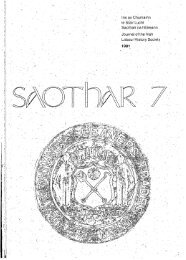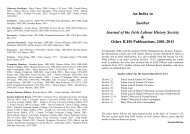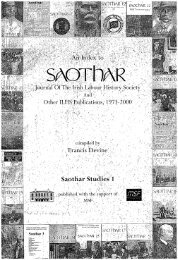12 SAOTHAR 13to report that the fair passed over 'without any of the scenes of drunkenness and disorder which tookplace at former times'. Still, if Dillon was partly frustrated, nevertheless the fair was held; horses wereoffered for sale and bought in his field; 'four or five hundred persons of the very lowest class collectedin this field each day'; drink was served in the village public houses, and there was sufficient animationabout the place for twenty eight arrests to be made for various transgressions. 41By the beginning of the new decade, then, the moral plague-spot was still not out. It was in thesecircumstances that the untiring Rev. Dr; Spratt and Rev. PJ. Nowlan redoubled their efforts to end theinfamy., In February, 1861 they wrote to the Chief Secretary of Ireland to insist that legislation wasabsolutely necessary .42 The government's response to their overtures, even though endorsed by PoliceCommissioner More O'Ferrall, was unhelpful,43 and the anxieties of clergy and police were reneweda few months later. On 1 July, 1861, with yet another fair in prospect, Crown Solicitor MatthewAnderson informed the Undersecretary that Eliza Dillon, whose spirit licence was successfullyquashed, was about to apply for anoiher licence for the same house and field, but was likely to use someother person's name 'in order to deceive the authorities'. He suggested that the Commissioners ofExcise refuse the licence 'if not to the person, then at least to the house and place in which such grossimmorality was proved to have been practised'in past years'.44 Next day, in reply, Corbett of the InlandRevenueiriLondon informed Larcom, the Undersecretary, that they had ordered the refusal of 'anyspirit licence for the house and premises at Donnybrook lately licensed as a public house in the nameof Miss Dillon'. Significantly, however, he added that the Revenue Commissioners pointed out that'the course now adopted is not a legal one' .45 Despite this warning the Lord Lieutenant went aheadand telegraphed Edward Steel, Acting Collector of Revenue in the Dublin Custom House, not to grantany spirit licence whatever in respect of these premises without further instruction. Four days laterwhen Elizaapplied for a beer dealer's licence he also ordered that none be given to her before 31 August,1861. 46At this point both police records and the press were silent as to what actually happened at the fairof 1861, but it seems likely that having been refused licences the Dillons proceeded to let other retailersof spirits and beer sell on their field. This conjecture is based on two points. Firstly, this is preciselywhat the Dillonsdid in the years after 1861 for which there is police information, as shall be seenpresently. And secondly, even as the authorities themselves were acting illegally according to InlandRevenue, moves were made to give the authorities the clout to act decisively in a legal manner: on 13June, 1862 the royal assent was given to a bill dealing with customs and excise duties. 47 Section 13 ofthis empowered the Revenue Commissioners to grant or to refuse an occasional licence for the sale ofbeer, wine, spirits or tobacco to existing licence holders at places outside their originally licensedpremises.In the summer of 1862 Dillon placarded' his field and gates with posters proclaiming thatDonnybrook Fair would commence on 'Walking Suriday' , 24 August, and that he had accommodationfor tents, stands, cattle and horse trading, and for the erection of booths for the sale of drink by licensedtraders. Divisional Superintendent McMahon acted immediately. He requested Inland Revenue torefuse all licences to sell drink in Dillon' s field or in any field adjacent' during the so-called Fair Weekat Donnybrook' . This request was swiftly and completely complied with, Nevertheless, despite all this,Commissioner More O'Ferrall had to admit to the Undersecretary that"the fair has been morenumerously attended this year than for some years past' , and McMahon reported from the spot that onSunday 24 August, 1862 Joseph Dillon had opened his field and conducted the fair until Saturday 30AugusLAccording to McMahon some 6,500 people visited Dillon' s field to enjoy four swinging boats,two merry-go-rounds, thirteen roulette tables, twenty shooting galleries, fiye ginger beer stands, elevenfruit and cake stands, one tent with stuffed whale and shark, one circus, one machine for weighing menand five tents for the saleof spirits and beer. Adding to this defiance, Dillon' s neighbour, publican J ohhLawlor who also had a field, opened his premises for the sale of horses; and, apart from the drink onsale in Dillon' s place, three village street publicans and one just outside the village had kept music anddancing going in their pubs till eleven o'clock each night of the fair.
·' <strong>THE</strong> DECLINE AND FALL <strong>OF</strong> DONNYBROOK FAIR 13McMahon's officers had had to admit that no drink had been sold in DiIIon' s house or by the DiIIonspersonalIy, and the I:'olice Superintendent had to concede that'DiIIon will succeed in continuing and reviving the fair unless his interest in the place is purchased or alegislative enactment for its abolition is passed. '48DiIIon had defied the authorities by getting licence holders from different parts of the cityto selI theirwares on his field, thereby flying in the face of the law. It proved to be a pyrrhic victory, however. Hecontinued to hold or to organise the fair in. the succeeding years of 1863 to 1866, using different setsof publicans from widely separated parts of the city each year, but police reports recorded dwindlingnumbers In attendance and dwindling entertainments. Average daily attendance feIl from 2,500 in theearly 1860s to a mere few hundred in 1865 and 1866.The symbolic climax to the conflict came in August, 1866. In that year Dillon and Donnybrook Fairvied with CuIlen and the Catholic Church for the support of the masses, resulting in a decided victoryfor the side of moral reform and social control: the foundation stone for the new Church of the SacredHeart, looking across to the old Fair Green, was laid in 1863 and the official opening for the completededifice was set for the traditional Walking Sunday in August, 1866, the opening day of DonnybrookFair. Thousands poured into the village on that Sunday of 1866. The church opening ceremony wasto be conducted by Paul CuIlen and special lustre was conferred on the occasion by virtue of the factthat he had become a Cardinal a mere eight weeks before this, the first such in Irish history. The localparish priest, Very Rev. Dean A. O'ConneIl, had intended the church not just as a means of providingmuch needed extra space but as an expiatory monument for the vices and wickedness of Donnybrook. Fair. On this point the press agreed with him, seeing it as 'a great landmark which will point out wherevice and immorality were vanquished' .49 The event proved one of the most memorable and impressiveof public occasions in the life of Dublin and of Ireland in the nineteenth century.On the very same day DilIon opened his field as usual in order to commence the annual festivitiesof Donnybrook Fair. This time he could only produce one licence holder willing to seIl drink in the field.Divisional Superintendent Daniel 0 'Donovan reported that a good number of gamblers were amongstthe crowds who came to attend the rival events, but, he added, their numbers were lessened 'by theappearance of some constables ... who interfered as far as possible to intimidate them'. He admittedthat this intimidation had good effect for 'their numbers grew less each day' and that the attempt torevive the old fair 'was a failure in toto this year'. It was his opinion that 'the last attempt had beenmade'. In this he was not quite correct: whereas by his own admission Joseph Dillon had finaIly givenup the attempt,50 two years later his daughter Eliza made one last effort: but after a few days the original'120 persons of the lowest class' who visited the field had fallen to a mere handful of 'horse dealers andragged idlers who are often to be seen lolling about corners'. In the triumphant words ofInspector PeterFitzpatrick of the new Donnybrook Police Station, 'thus ended the great failure of the attempt to reviveDonnybrook Fair'. He had his own explanation for the failure:'1 attribute the fall of Donnybrook Fair to the absence of music in the public houses of Donnybrook andthe neighbouring locality as there was not a sound of music to be heard in any public house in the wholesubdivision; no doubt they all dreaded the refusal of their licences if they went against the policearrangements which were carried out effectively.'slDonnybrook Fair finally ended in 1868, thirteen years after its abolition had been prematurelyannounced. The police were not slow to take credi t for its decline and fall. They had harried the hackneymen, thwarted the publicans, silenced the music and intimidated the gamblers. Their Commissionershad publicly given written and financial suppport to this particular cause of moral reform and socialcontrol. They did this at a time when the DMP force was run with a ruthless regimen and when itsaverage police constable was so badly paid that protest on their conditions appeared in print in the very
- Page 1 and 2: JOURNAL OF THE IRISH LABOUR HISTORY
- Page 3 and 4: ContentsPageEditorial: Labour Histo
- Page 5 and 6: EDITORIAL 3freedom to participate i
- Page 7 and 8: CorrespondenceThe Irish Labour Part
- Page 9 and 10: ; ~ ; ,The Decline and Fall of Donn
- Page 11 and 12: THE DECLINE AND FALL OF DONNYBROOK
- Page 13: THE DECLINE AND FALL OF DONNYBROOK
- Page 17 and 18: THE DECLINE AND FALL OF DONNYBROOK
- Page 19 and 20: THE DECLINE AND FALL OF DONNYBROOK
- Page 21 and 22: THE DECLINE AND FALL OF DONNYBROOK
- Page 23 and 24: THE DECLINE AND FALL OF DONNYBROOK
- Page 25 and 26: ,'-,;-''''.A PASSAGE TO BRITAIN 23C
- Page 27 and 28: A PASSAGE TO BRITAIN 25only in the
- Page 29 and 30: A PASSAGE TO BRITAIN 27clothing._De
- Page 31 and 32: A PASSAGE TO BRITAIN 29established
- Page 33 and 34: ;:-.",.- .. .", ...... '.:. '
- Page 35 and 36: LOUIE BENNETI 33feminist movement w
- Page 37 and 38: :... ~: ."
- Page 39 and 40: -.- '.LOUlE BENNETT 37While there i
- Page 41 and 42: LOUIE ~ENNEIT 39Xl's encyclical Qua
- Page 43 and 44: LOUIE BENNEIT 41Bennett's own relat
- Page 45 and 46: LODIE BENNETT 43109; IWWU resolutio
- Page 47 and 48: Essays in ReviewCosherers, Wanderer
- Page 49 and 50: ••• .".'. >. '~"ESSA YS IN RE
- Page 51 and 52: ESSAYS IN REVIEW 49ConnolIy:Myth an
- Page 53 and 54: ESSAYS IN ~EVIEW 51tion' in the Int
- Page 55 and 56: ESSAYS IN REVIEW53International:'I
- Page 57 and 58: REVIEWScontroversy is real history.
- Page 59 and 60: REVIEWSJoe Monks was among the earl
- Page 61 and 62: REVIEWSnolly-Column Song','Proudly
- Page 63 and 64: REVIEWSresulting from the arrival o
- Page 65 and 66:
REVIEWS,63the book by means of an a
- Page 67 and 68:
REVIEWSlogue, it is hardly surprisi
- Page 69 and 70:
The Team For All Workers ...CULIAIB
- Page 71 and 72:
ESSAYS 69mission and moral refonn.l
- Page 73 and 74:
.. ...... ~.~ -~ .'- '.ESSAYS. 71fr
- Page 75 and 76:
ESSAYS 73claimed authority but whic
- Page 77 and 78:
ESSAYS 75provided the basis for soc
- Page 79 and 80:
ESSAYS 779. For comparisons see E.T
- Page 81 and 82:
ESSAYS 7952. Annals of Christ Churc
- Page 83 and 84:
ESSAYS' 81Fianna Fail and the Worki
- Page 85 and 86:
ESSAYS 83Eireann in 1925 visibly di
- Page 87 and 88:
ESSAYS 85recognition of the impract
- Page 89 and 90:
ESSAYS 871970, it created the condi
- Page 91 and 92:
ESSAYS89The Irish Immigrants' Contr
- Page 93 and 94:
ESSAYS" 91Although anti -Catholic p
- Page 95 and 96:
ESSAYS 93McCowie played a key role
- Page 97 and 98:
:. -,,'.' ',. .~.,:.ESSAYS 95Althou
- Page 99 and 100:
ESSAYS 97young girl of their own ba
- Page 101 and 102:
SourcesIrish Labour History Society
- Page 103 and 104:
SOURCES 101INovember, 1971 to no. 1
- Page 105 and 106:
SOURCES 103would claim credit for t
- Page 107 and 108:
SOURCES105Sources for Irish Labour
- Page 109 and 110:
SOURCES 107NorthWest Archives and L
- Page 111 and 112:
SOURCES 109In 1966 the Finnish gove
- Page 113 and 114:
TURNINGANEWLEAFThe CPSSUis the larg
- Page 115 and 116:
REMINISCENCE 113us due to my politi
- Page 117 and 118:
REMINISCENCE 115when Jim was presen
- Page 119 and 120:
REMINISCENCE 117of Dail Eireann. 17
- Page 121 and 122:
REMINISCENCE 119NotesThe above arti
- Page 123 and 124:
DOCUMENT STUDY 121James Connolly in
- Page 125 and 126:
DOCUMENT STUDY123SOCIAL DEMOCRATIC
- Page 127 and 128:
DOCUMENT STUDY 125proletariat of th
- Page 129 and 130:
DOCUMENT STUDY 127the support of Je
- Page 131 and 132:
DOCUMENT STUDY 12926. The Workers'
- Page 133 and 134:
131BibliographyA Bibliography of Ir
- Page 135 and 136:
BIBLIOGRAPHY 133Compton, P.A. Demog
- Page 137 and 138:
BIBLIOGRAPHY 135Levine, I. and Madd
- Page 139 and 140:
BIBLIOGRAPHY 137Turner, M. 'Towards
- Page 141 and 142:
BIBLIOGRAPHY 1394. Land and Agricul
- Page 143 and 144:
BIBLIOGRAPHY 141Clogher Record12 (2
- Page 145 and 146:
BIBLIOGRAPHY 143Political Research
- Page 147 and 148:
BIBLIOGRAPHY 145Pres, 1987.O'Brien,
- Page 149 and 150:
147Notes on Contributorsf onathanBe
- Page 151 and 152:
1901: Ireland's first general union
- Page 153 and 154:
ELECTRICAL TRADES UNION .Establishe





